Balancing Sustainability and Comfort in Punta Cana: Eco-Tourism vs. Modern Amenities in 2025
Understanding Eco-Tourism in Punta Cana
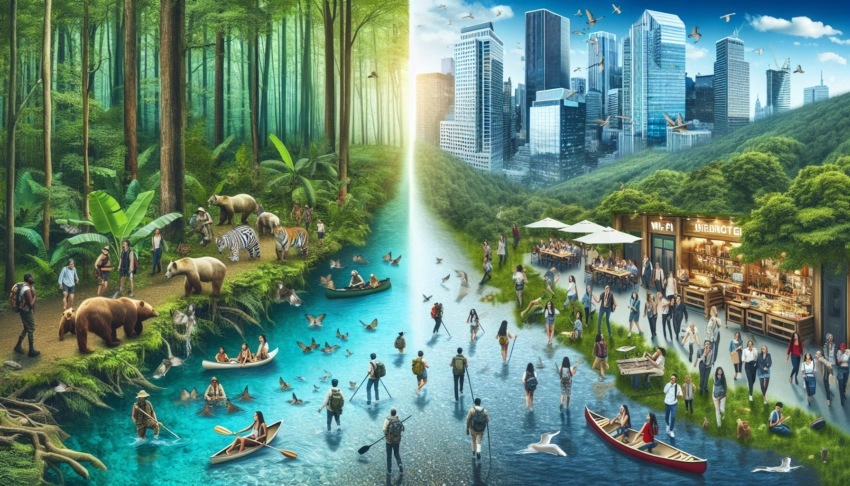
Balancing Sustainability and Comfort in Punta Cana: Eco-Tourism vs. Modern Amenities in 2025
Eco-tourism is rapidly gaining traction in Punta Cana, transforming the travel landscape by marrying environmental consciousness with local cultural engagement. This burgeoning trend not only caters to eco-conscious travelers but also contributes significantly to sustainable development in the region.
1. What is Eco-Tourism?
Eco-tourism is a form of sustainable travel that prioritizes the preservation of natural environments and the well-being of local communities. Its core principles include minimizing environmental impact, building environmental and cultural awareness, and providing positive experiences for both visitors and hosts. By focusing on environmental conservation and fostering local community engagement, eco-tourism aims to create a symbiotic relationship between tourism and nature.
In Punta Cana, eco-tourism initiatives emphasize the protection of the region’s rich biodiversity, from pristine beaches and coral reefs to lush rainforests and endemic wildlife. Travelers are encouraged to participate in activities that respect the local ecosystem, such as guided nature walks, bird watching, and visiting protected areas. These experiences not only educate visitors about environmental issues but also promote a deeper appreciation for the natural wonders of Punta Cana.
2. The Growth of Eco-Tourism in Punta Cana
The rise of eco-tourism in Punta Cana can be attributed to a growing global awareness of environmental issues and a shift in traveler preferences towards more sustainable and authentic experiences. Over the past decade, several key initiatives have been launched to promote eco-friendly tourism in the region. Notable examples include the establishment of the Punta Cana Ecological Foundation, which works to conserve the area’s natural resources through research, education, and sustainable practices.
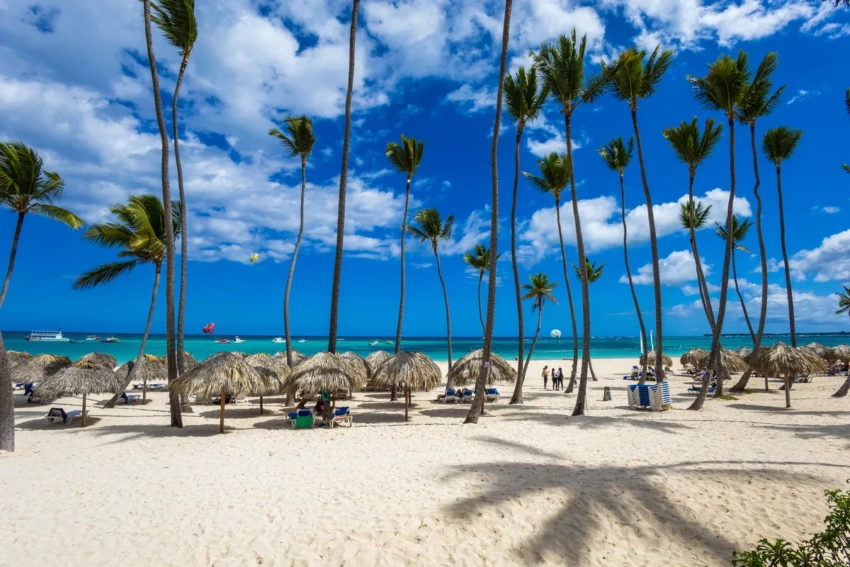
Punta Cana
Eco-friendly destinations such as the Indigenous Eyes Ecological Park and Reserve offer visitors a chance to explore over 1,500 acres of protected land, featuring trails, lagoons, and diverse wildlife. These eco-destinations not only provide immersive nature experiences but also contribute to the conservation of Punta Cana’s unique ecosystems.
3. Benefits of Eco-Tourism for Local Communities
Eco-tourism in Punta Cana plays a crucial role in supporting local economies and preserving cultural heritage. By focusing on locally owned and operated businesses, eco-tourism helps ensure that tourism revenue directly benefits community members. This, in turn, leads to job creation and improved livelihoods for residents.
Moreover, eco-tourism fosters cultural exchange and awareness, encouraging travelers to engage with local customs, traditions, and cuisines. This cultural immersion enriches the visitor experience and helps preserve Punta Cana’s unique cultural identity. Additionally, eco-tourism initiatives often include educational programs that raise environmental awareness among both tourists and locals, promoting sustainable practices that benefit the entire community.
Eco-Tourism Initiatives in Punta Cana
| Initiative | Focus | Impact |
|---|---|---|
| Punta Cana Ecological Foundation | Research & Conservation | Protects natural resources |
| Indigenous Eyes Ecological Park | Ecological Preservation | Educational & immersive experiences |
| Local Artisan Markets | Cultural Preservation | Supports local crafts & traditions |
In summary, eco-tourism in Punta Cana represents a harmonious blend of environmental stewardship and cultural appreciation. As the demand for sustainable travel continues to grow, the region’s commitment to eco-tourism not only promises to enhance the visitor experience but also ensures the preservation of Punta Cana’s natural and cultural heritage for generations to come.
Modern Amenities and Their Appeal to Tourists
In an ever-evolving travel landscape, Punta Cana stands out as a destination that seamlessly blends modern amenities with the principles of eco-tourism. As travelers seek both luxury and sustainability, understanding how these elements coexist offers valuable insights into this Caribbean paradise’s future.
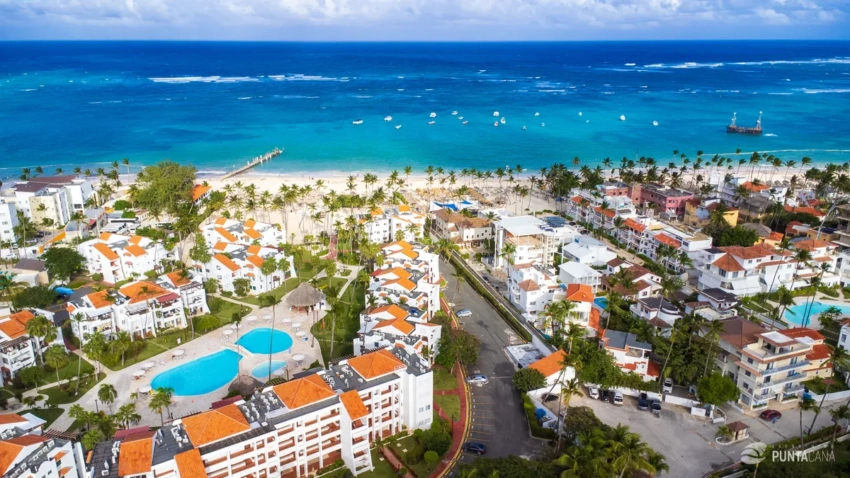
Punta Cana
1. Luxury Resorts and Hotels
Punta Cana is renowned for its luxurious accommodations that cater to discerning travelers looking for an unparalleled experience. The array of high-end resorts and hotels, such as the renowned Tortuga Bay Hotel and the opulent Eden Roc, offer guests sumptuous rooms, world-class dining, and exclusive beach access. These establishments are designed to provide the utmost comfort and relaxation, often featuring private pools, spa treatments, and personalized services that elevate the vacation experience.
However, the allure of luxury doesn’t overshadow the importance of sustainability. Many of these resorts are increasingly adopting eco-friendly practices, such as using locally sourced materials, reducing energy consumption, and investing in community-based projects. This dual focus on luxury and sustainability is not only a trend but a necessity as travelers become more environmentally conscious.
2. Technological Advancements in Hospitality
Technology has become a cornerstone in enhancing the guest experience in Punta Cana’s hospitality sector. The integration of smart technology in hotel rooms allows guests to control lighting, temperature, and entertainment systems with ease, often through a single app on their smartphones. This seamless integration of technology not only boosts convenience but also contributes to energy efficiency, as systems can be programmed to reduce power usage when rooms are unoccupied.
Another technological advancement is the implementation of digital concierge services. Guests can now book excursions, make dinner reservations, and even check in and out of hotels via digital platforms, minimizing the need for physical contact and enhancing the overall efficiency of services. These innovations not only appeal to tech-savvy travelers but also align with eco-friendly practices by reducing paper usage and streamlining operations.
3. Balancing Luxury and Eco-Friendliness
The challenge of maintaining luxury while embracing eco-friendly practices is being tackled head-on by many of Punta Cana’s resorts. Hotels are increasingly adopting sustainable initiatives that do not compromise on comfort. For example, solar panels are being utilized to generate clean energy, while water conservation systems are implemented to reduce waste. These efforts are complemented by initiatives like beach clean-ups and coral reef restoration projects, which engage both guests and staff in environmental stewardship.
Our Best Villa Rentals in Punta Cana
Experience the ultimate blend of luxury and sustainability with our exclusive villa rentals in Punta Cana. Each villa promises an unforgettable stay, combining modern comforts with eco-friendly amenities.
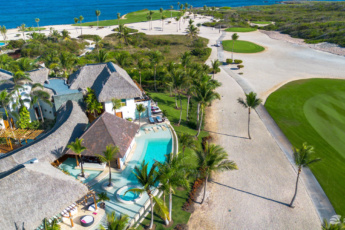
Villa Agapi (Caleton Estates 57) - The Most Beautiful Ocean View Villa in Cap Cana
from $2850 night Read more
Exclusive Ocean View 5-Star Cap Cana Villa for Rent - Chef, Butler, Maid & Golf Cart
from $4600 night Read more
Private Villa at Puntacana Resort & Club for Rent - Pool, Jacuzzi, BBQ, Maid, Cinema Room
from $1569 night Read more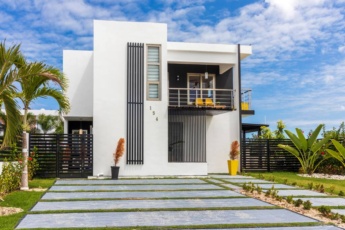
Modern & Stylish 4-BR Family-Friendly Villa Rental in a Quiet and Gated Community in Bávaro, Punta Cana
from $189 night Read moreWith the hospitality industry in Punta Cana placing an increasing emphasis on both luxury and sustainability, tourists can enjoy the best of both worlds. As the demand for eco-friendly travel options grows, the ability of resorts to offer modern comforts while minimizing environmental impact will be key to attracting discerning travelers in 2025 and beyond.
Sustainable Practices in Punta Cana’s Hospitality Sector
In the heart of the Caribbean, Punta Cana is setting a benchmark for sustainable tourism. As the demand for eco-friendly travel grows, the hospitality sector is taking significant strides to reduce its environmental footprint while maintaining the allure of a tropical paradise.
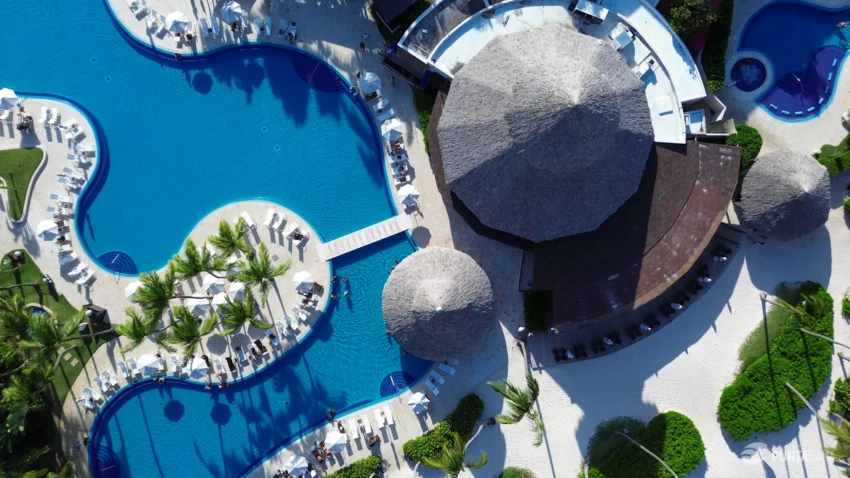
Punta Cana, drone view
1. Green Building and Design
As the hospitality industry in Punta Cana continues to expand, there is a growing emphasis on sustainable architecture and the use of eco-friendly materials. Hotels and resorts are increasingly adopting innovative building techniques that minimize environmental impact. This includes the use of locally sourced materials that reduce transportation emissions and the implementation of natural ventilation systems that lessen dependency on artificial climate control.
One of the standout developments in this area is the integration of green roofs and living walls, which not only enhance the aesthetic appeal of buildings but also contribute to temperature regulation and air quality improvement. These structures serve as natural insulators and provide habitats for native wildlife, supporting biodiversity.
Sustainable Architecture Features in Punta Cana Hotels
| Feature | Benefits | Example |
|---|---|---|
| Green Roofs | Improves insulation, supports biodiversity | Eco-Resort XYZ |
| Reclaimed Wood | Reduces deforestation, enhances rustic charm | Beachfront Retreat ABC |
| Natural Ventilation | Decreases energy use, improves air quality | Ocean View Hotel 123 |
2. Waste Management and Recycling Programs
Waste management is a critical component of sustainable practices in Punta Cana’s hospitality sector. Resorts are implementing comprehensive recycling programs to reduce the amount of waste that ends up in landfills. By separating recyclables from non-recyclables, these establishments are able to repurpose materials such as glass, paper, and plastics.
Furthermore, many resorts are taking it a step further by introducing composting initiatives that convert organic waste into nutrient-rich soil, which is then used to nourish gardens and landscaped areas within the resorts.
These efforts not only help reduce the environmental impact but also raise awareness among tourists about the importance of waste reduction and recycling, fostering a culture of sustainability.
3. Water and Energy Conservation
In a region where natural resources are precious, water and energy conservation are paramount. Punta Cana’s resorts are pioneering in the adoption of technologies aimed at minimizing resource consumption. Solar panels are becoming a common sight, capturing the abundant sunshine to generate clean energy that powers resort operations.
In addition, the use of water-saving technologies such as low-flow faucets and showerheads, along with smart irrigation systems, ensures that water is used efficiently without compromising guest comfort. These initiatives not only reduce operational costs but also contribute significantly to the preservation of local water sources.
Our Best Villa Rentals in Punta Cana
Embrace the perfect blend of luxury and sustainability by exploring our curated selection of villa rentals in Punta Cana. Each property promises modern amenities while adhering to eco-friendly principles, allowing you to enjoy your stay responsibly.

Luxury Punta Cana Golf Villa in Gated Cocotal Community - Pool, Gym & Movie Room
from $2496 night Read more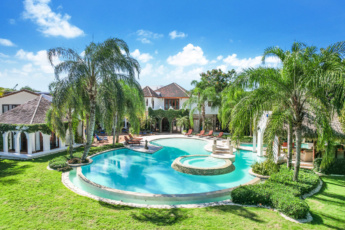
5-Star Villa for Rent in Moroccan-Style at Casa de Campo - Large Pool, Jacuzzi & Staff
from $3744 night Read more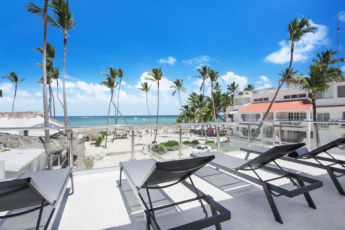
Luxury Villa Right on Los Corales Beach - With Heated Pool, Maid & Chef in Bávaro
from $2995 night Read more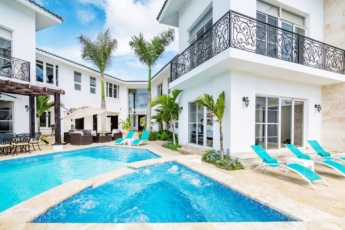
Huge Villa for Large Groups in Bavaro (Cocotal) - Up to 16 People With Pool, Jacuzzi, Chef & Maid
from $2621 night Read moreThe Role of Local Government and Policies
In the dynamic landscape of Punta Cana, local governance plays a pivotal role in integrating sustainability with economic growth. As eco-tourism and modern amenities grow, policies and government actions shape how these elements coexist, ensuring the region’s natural beauty is preserved for future generations.
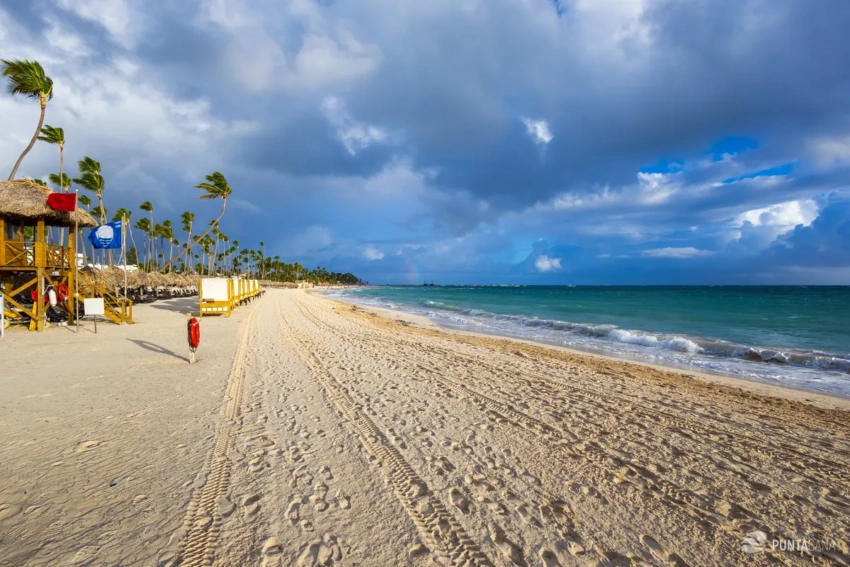
Punta Cana
1. Regulations Supporting Sustainable Tourism
The local government of Punta Cana has implemented a range of regulations designed to support sustainable tourism, focusing on environmental stewardship while promoting economic growth. Key among these are zoning laws that limit development in ecologically sensitive areas, ensuring the protection of Punta Cana’s lush landscapes and marine environments.
- Environmental Impact Assessments: New projects are required to undergo rigorous evaluations to assess their potential impact on the environment, ensuring that only eco-conscious developments proceed.
- Eco-Certifications: Initiatives to promote eco-certifications for hotels and resorts encourage adherence to sustainable practices, such as energy conservation and waste reduction.
- Tourism Carrying Capacity: Regulations are in place to limit the number of tourists in specific areas, preventing overcrowding and minimizing ecological stress on local resources.
These measures not only safeguard natural resources but also enhance the appeal of Punta Cana as a destination committed to sustainability.
2. Partnerships with Environmental Organizations
To bolster eco-tourism efforts, the local government collaborates with various environmental organizations, leveraging their expertise and resources. These partnerships are crucial in developing and implementing effective conservation strategies.
One notable collaboration is with the Punta Cana Ecological Foundation, which works on projects ranging from reforestation to coral reef restoration. Such initiatives are vital in maintaining biodiversity and ensuring the health of marine ecosystems.
Additionally, joint efforts focus on community-based tourism projects that empower local communities, providing them with skills and resources to engage in sustainable tourism practices. These partnerships not only enhance environmental conservation but also foster economic development and cultural preservation.
3. Challenges in Policy Implementation
Despite the robust framework for sustainable tourism, several challenges persist in policy implementation. A significant obstacle is ensuring compliance among diverse stakeholders, including large resorts and small local businesses. Balancing economic interests with environmental priorities requires continuous dialogue and negotiation.
Moreover, resource constraints often limit the enforcement capabilities of regulatory bodies. Insufficient funding and staffing can impede the rigorous monitoring and evaluation necessary for effective policy implementation. Addressing these challenges requires innovative solutions and increased investment in capacity-building initiatives.
Looking ahead, the evolution of Punta Cana’s tourism sector hinges on the successful implementation of sustainable policies. By fostering collaboration and addressing implementation challenges, local governance can create a harmonious balance between eco-tourism and modern amenities, ensuring the region’s prosperity for years to come.
Future Prospects: Eco-Tourism and Modern Amenities in 2025
As Punta Cana strides toward a sustainable future, the interplay between eco-tourism and modern amenities becomes increasingly vital. By 2025, the region aims to achieve a harmonious balance that not only attracts tourists but also preserves its rich biodiversity and supports its local communities.
1. Emerging Trends in Sustainable Tourism
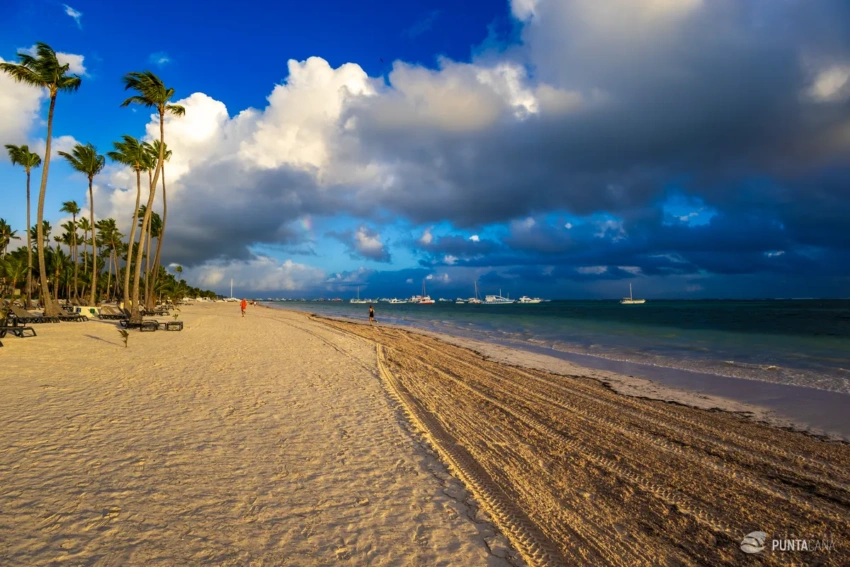
Punta Cana
The future of tourism in Punta Cana is set to be defined by several emerging trends in sustainable tourism. Carbon-neutral travel is gaining traction, with an increasing number of airlines and travel agencies offering carbon offset programs. These initiatives allow tourists to compensate for their carbon footprints, thus reducing the environmental impact of travel. Additionally, the rise of eco-certifications for accommodations and tour operators ensures that businesses adhere to strict environmental standards, further promoting sustainable practices.
Another emerging trend is the integration of nature-based experiences in travel itineraries. Travelers are increasingly seeking immersive adventures that connect them with nature, such as guided jungle tours, wildlife conservation projects, and agro-tourism experiences, where they can learn and contribute to local agriculture.
2. Innovative Solutions for Balancing Needs
As the demand for both sustainability and modern conveniences escalates, innovative solutions are essential to bridge these two aspects. One promising approach is the use of smart tourism technology. This involves utilizing apps and digital platforms to enhance visitor experiences while minimizing environmental impact. For example, visitors can use apps to plan eco-friendly transport options, reduce paper usage by opting for digital tickets, and even participate in virtual tours to decrease physical footfall in sensitive areas.
Moreover, the concept of biophilic design is increasingly adopted in architectural projects, blending natural elements with modern infrastructure. This design philosophy not only enhances aesthetics but also improves air quality and promotes mental well-being, providing a soothing sanctuary for guests without compromising on contemporary comforts.
3. Long-Term Benefits for Punta Cana’s Ecosystem
The successful integration of eco-tourism and modern amenities promises significant long-term benefits for Punta Cana. Environmentally, embracing sustainable tourism practices can lead to the preservation of local flora and fauna, ensuring that diverse ecosystems remain intact for future generations. Economically, fostering a reputation as an eco-friendly destination can attract a niche market of eco-conscious travelers, boosting income for local businesses and inspiring investments in green technologies.
In conclusion, Punta Cana’s commitment to balancing sustainability with modern amenities positions it as a leader in responsible tourism. By embracing emerging trends and implementing innovative solutions, the region not only safeguards its natural beauty but also enhances its global appeal as a top-tier travel destination.
Frequently Asked Questions
What are the main attractions for eco-tourists in Punta Cana in 2025?
Punta Cana offers a range of eco-friendly activities including guided tours of protected natural reserves, bird watching in Indigenous Eyes Ecological Park, and snorkeling in the coral reefs. These attractions highlight the region’s commitment to preserving its biodiversity.
How have hotels in Punta Cana adapted to meet sustainability goals while providing modern amenities?
Many hotels in Punta Cana have integrated sustainable practices such as using solar panels, implementing water recycling systems, and offering locally sourced food options. At the same time, they continue to provide modern amenities like Wi-Fi, air conditioning, and luxurious spa services to ensure guest comfort.
Is it possible to enjoy luxury in Punta Cana without compromising on environmental responsibility?
Yes, several resorts in Punta Cana offer luxury experiences that are also environmentally responsible. These resorts often use eco-friendly materials in construction, support local conservation projects, and employ sustainable energy sources to reduce their carbon footprint.
What transportation options are available for eco-conscious travelers in Punta Cana?
Eco-conscious travelers can opt for electric shuttle services, bike rentals, or guided tours that use low-emission vehicles. Public transportation has also been improved to reduce environmental impact while accommodating tourists comfortably.
Are there any local initiatives promoting sustainable tourism in Punta Cana?
Yes, local initiatives such as the Punta Cana Ecological Foundation focus on environmental education, conservation projects, and community engagement to promote sustainable tourism practices across the region.
How can travelers ensure their visit to Punta Cana in 2025 supports sustainable tourism?
Travelers can support sustainable tourism by choosing eco-certified accommodations, participating in environmentally friendly activities, and respecting local cultures and natural habitats. Contributing to local conservation projects and being mindful of resource consumption are also important.
What challenges does Punta Cana face in balancing eco-tourism with modern amenities?
Punta Cana faces challenges such as managing the environmental impact of increased tourist numbers, balancing economic benefits with ecological preservation, and ensuring that infrastructure development does not harm natural ecosystems. Continuous efforts are needed to address these issues effectively.
Are there any government regulations in place to ensure sustainable development in Punta Cana?
The Dominican government has implemented regulations aimed at promoting sustainable tourism, such as environmental protection laws and guidelines for sustainable hotel operations. However, the enforcement of these regulations can vary, and ongoing monitoring is essential to ensure compliance.
